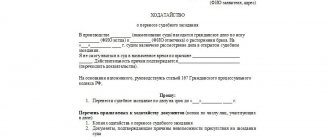Marriage concept
There is no article in the Family Code that directly contains the concept of marriage.
However, based on the principles mentioned by law, the following definition can be formulated. Marriage is a union between a man and a woman, entailing the emergence of personal and property rights and obligations, based on voluntariness and equality. His goal is to create a family.
The following conclusions follow from this:
- in Russia, same-sex marriages are not registered, as well as with animals or objects;
- husband and wife are equal partners, that is, neither of them has privileges before the law;
- after the marriage is registered, the resulting property and debt obligations will be shared;
- the principle of voluntariness implies that every person has the right to marry whomever he wishes, and no one should influence this choice;
- starting a family should be a fundamental desire (not any benefits).
The concept of “civil marriage” from the point of view of the law is precisely a legalized relationship in the registry office, and not the colloquially accepted definition of “cohabitation”. And no matter how many years a couple lives together, such relationships do not give rise to legal consequences.
Age required for marriage registration
The generally accepted “age of marriage” is 18 years. This is also the age of full legal capacity.
However, you can get married at the age of 16. But to do this, you must apply for permission from the local government, confirming the presence of valid reasons.
The most common reasons for lowering the marriageable age:
- Expecting a common child;
- Or his birth;
- Already established family relationships.
It is worth noting that parental approval for minors is not required.
In some constituent entities of the Russian Federation, it is possible to get married before the age of 16.
But for this you will need to submit an application to the central executive body addressed to the Governor. This can be done both by those wishing to get married and by their parents. But if there is a conflict between them, then this application will be considered only after the approval of the guardianship and trusteeship authorities.
For example, in Moscow and the region, the governor will give permission for registration provided that the bride is pregnant, has a common child, and also if there is a threat to the life of any of the future spouses.
The minimum age at which the registry office will accept an application is not established by law. But, based on the fact that the list of required documents includes a citizen’s passport, we can conclude that this threshold is 14 years.
Young people who get married before reaching the age of 18 become absolutely capable (emancipation occurs) and do not lose this status even after the divorce.
Conditions and procedure for marriage
Under what conditions can marriage be concluded, the validity of marriage
Marriage in the Russian Federation is a monogamous, voluntary, equal union of a man and a woman, concluded in the manner prescribed by law.
In the Russian Federation, only marriages entered into at the civil registry office are recognized as valid. The rights and obligations of spouses arise in accordance with paragraph 2 of Art. 10 of the RF IC from the date of state registration with the civil registration authorities. A marriage concluded in a church, or a marriage concluded according to local or national rituals, is not a marriage from a legal point of view and does not give rise to any legal consequences. The exception is marriages concluded in church form in the occupied territories that were part of the USSR during the Great Patriotic War. Such marriages, in accordance with family law, have legal force and do not require subsequent registration with the civil registry office. Actual marital relations that are not registered with the civil registry office are not considered a marriage, that is, they do not give rise to legal consequences. The first necessary condition for marriage is its registration with the civil registry office.
The second necessary condition for marriage, provided for by the RF IC, is the mutual voluntary consent of the man and woman entering into marriage. Forced marriage is not permitted. The choice of a spouse should depend only on the will of the person wishing to marry, and no one, including close relatives, has the right to prohibit a marriage or force it to be concluded. Therefore, marriage must be voluntary. In addition, the consent of the man and woman entering into marriage must be mutual.
To enter into marriage, persons wishing to marry must reach the age of marriage - the third necessary condition for marriage. The RF IC establishes a general rule that the age of marriage is eighteen years old. Reducing the marriageable age to sixteen years is permitted only with the permission of the guardianship and trusteeship authorities (local government bodies) and only if two mandatory factors are present. This requires: the presence of valid reasons (the extent to which these reasons are valid is assessed by the guardianship and trusteeship authorities), and a request from minors wishing to get married to the guardianship and trusteeship authorities to allow them to marry.
How marriage is concluded, the procedure for concluding marriage
An application for marriage is submitted to the civil registry office by both persons wishing to marry. An application for marriage can be submitted by one person, provided that there is a notarized signature of the other spouse. Marriage registration is allowed only in the presence of both spouses.
Filing an application to the civil registry office has no legal consequences, and any of the persons who submitted such an application has the right to refuse to marry before the expiration of a month.
In the presence of special circumstances, which the law includes pregnancy, the birth of a child, or an immediate threat to the life of one of the parties, the marriage can be concluded on the day the application is submitted. In these cases, persons getting married can choose at their own discretion: to request a reduction in the period for registering a marriage or to register a marriage on the day of filing the application - depending on what is more convenient for them.
Special circumstances, as well as valid reasons, must be confirmed by relevant documents, which may be, for example, a medical certificate (in case of proof of pregnancy or birth of a child) or other documents.
Right to marriage
Absolutely all citizens of the Russian Federation (subject to the necessary conditions) can be registered as spouses. This simple rule follows from the principles enshrined in the Family Code.
If applicants are denied because of their nationality, race, or religion, this will indicate discrimination, and they can go to court for protection.
Conditions and procedure for marriage
Marriage registration takes place at the civil registry office (registry office), in a formal or ordinary setting - at the choice of the spouses.
The bride and groom must be present at the wedding in person - this is a mandatory condition necessary to confirm the voluntariness of the decision.
There are situations in which a civil registry office employee will register outside the walls of the institution:
- when one of the future spouses is in the hospital or at home due to illness;
- when marriage is concluded with a citizen sentenced to imprisonment (or in custody).
The law does not provide for other reasons for exit registration.
The conditions for marriage are simple:
- persons wishing to legitimize the union act voluntarily;
- they have reached the required age;
- there are no obstacles.
Time and place of registration
The date that applicants can choose to register their marriage must be no earlier than one month and no later than twelve months after submitting the application. The newlyweds also indicate the desired time of registration (based on the working hours of the registry office). It is impossible to change them in the future without the permission of the head of the registration authority.
But there are a number of special life circumstances that speed up registration, without the expiration of a month:
- pregnancy;
- birth of a child;
- if the life and health of any of the parties is threatened.
And if necessary, you can “sign” on the day of submitting the application.
The place of marriage will be the registry office to which the spouses’ application was submitted. Newlyweds have the right to choose absolutely any registry office, without reference to the area in which they are registered.
Circumstances preventing marriage
There are a number of reasons why you can't get married
There are four circumstances in the law in which refusal to accept an application for marriage registration will be lawful:
- Any of the applicants is already officially married. This clause of the law says that the principle of monogamy operates in the country.
- Close family relationships. That is, a union between close relatives and between brother and sister (even half-siblings) is impossible. Thus, incest is prohibited by law.
- The relationship between the adoptive parent and the adopted child also cannot be legitimized. Because the state equates them to blood relatives.
- If one of the future spouses has the status of incapacitated due to a mental disorder.
A person who is unable to account for his actions and decisions cannot get married, even with the permission of his guardian. Because the voluntariness of this act will be in doubt.
Marriage or not marriage - that is the question
There are a number of concepts similar in content - “unregistered marriage”, “informal marriage”, “de facto marital relations”, “cohabitation”, which define the relationship between cohabiting partners that are not formalized in the established manner as marriage.
In Russia, the term “actual marital relations” was introduced into use by the KZoBSO RSFSR in 1926.
By the decree of the Presidium of the Supreme Soviet of the USSR of July 8, 1944, de facto marriage relations were deprived of legal force.
Persons who were members of them were given the opportunity to register a marriage, indicating the duration of their actual life together.
If such registration turned out to be impossible, since one of the de facto spouses died or went missing at the front during the Great Patriotic War, then the other de facto spouse was given the right to apply to the court to recognize him (her) as the spouse of the deceased or missing person. based on previous legislation.
Family rights and responsibilities of spouses
The rights and obligations of spouses are divided into personal and property
Personal non-property rights:
- Right to equality.
- A husband and wife have the legal right to choose their profession, what to do, and where to live. This provision departs from the constitutional principle of equality of all citizens.
- All issues related to the spouses’ children (upbringing, education, etc.) must be resolved together; no one has more privileges in decision-making.
- Relationships within the family should be based on mutual respect and assistance.
- The right to choose a surname
Spouses can leave their premarital surnames, or they can do the following with them: take the surname of the husband or wife as a common one or add the surname of another to their surname. But the latter is impossible if the premarital surname is already double.
If, while married, a person wishes to change his surname (within the framework of Article 19 of the Civil Code of the Russian Federation), then this in no way affects the surname of the spouse.
After a divorce, both parties have the right to keep their married surname or restore their previous one.
Video that talks about the rights and responsibilities of spouses:
Property rights of spouses
Property rights are divided into two types: legal regime (joint property) and contractual regime (nuptial agreement).
- Joint property is all income of persons that does not have a special purpose, received during the marriage. As well as any property purchased with this money (real estate, securities, shares in capital, etc.).
- A marriage contract defines property rights and obligations during the marriage or in the event of its dissolution. It may contain provisions relating to present and future property.
Article 30 of the RF IC. Consequences of declaring a marriage invalid (current version)
1. The legal essence of recognizing a marriage as invalid is expressed in its legal consequences. Their essence is that such a marriage does not give rise to the corresponding rights and obligations of the spouses. Recognition of a marriage as invalid makes it possible not only, like a divorce, to terminate legal relations arising from the marriage for the future, but also to restore the situation that existed before the marriage (in particular, spouses lose the right to a common surname, common citizenship, the right to use each other’s home friend, the right to mutual maintenance (alimony), the marriage contract is declared invalid, etc.). The exception is the rights of children and the rights of conscientious spouses (see commentary to paragraphs 3, 4, 5 of the commented article).
2. The issue of property acquired during such a marriage is regulated in a special way. The legal regime of such property is regulated not by the norms of family law on joint property of spouses, but by the norms of civil law on shared property.
Common property is called shared property when each of its participants owns a certain share, which is usually expressed as an arithmetic fraction (ideal share). If the law, agreement or other act on the basis of which common property is established does not define the shares of each of the co-owners, then their shares are assumed to be equal.
Possession and use of common shared property is carried out by agreement of all co-owners, and if agreement is not reached, the dispute is resolved by court. The procedure for the possession and use of property in shared ownership, if agreement between the co-owners is not reached, may be established by the court by virtue of direct instructions of the law.
A co-owner has the right to demand the provision of a part of the common property for his possession and use in proportion to his share, and if this is impossible, to demand appropriate compensation from the remaining co-owners who own and use the property falling on his share.
The disposal of common shared property is also carried out with the consent of all its participants. Moreover, each participant in common shared ownership can also dispose of his share, and the consent of other co-owners is not required for this. However, when selling a share to an outside party, other participants have the right of first refusal, which consists in the fact that they have a preemptive right to purchase the share at the price for which it is sold, and on other equal conditions, with the exception of cases of sale at public auction. The seller of a share must notify the other co-owners in writing of his intention to sell it to a third party. For the sale of a share of real estate, the notice period is 30 days, and for movable property - 10 days. After the expiration of the specified periods, if the co-owners have not expressed their intention to purchase the share, the seller has the right to sell it to a third party.
If the spouses whose marriage was declared invalid entered into a marriage contract (see commentary to Articles 40 - 42), then it is also declared invalid. In this case, this is due to the fact that marriage is an indispensable condition for concluding such an agreement. Therefore, declaring a marriage invalid automatically entails the invalidity of the contract itself.
On the consequences of the invalidity of a marriage contract as an invalid transaction, see Article 167 of the Civil Code of the Russian Federation. According to paragraph 1 of this article, an invalid transaction does not entail legal consequences, except for those related to its invalidity, and is invalid from the moment of its completion.
3. Recognition of a marriage as invalid does not affect the rights of children born in such a marriage. It follows from this that children born in a marriage declared invalid, or within three hundred days (this period is considered the maximum for bearing a child) from the date it was declared invalid, have the same rights as children born in a marriage. In particular, it is assumed that the father of the child is the husband of the child's mother, who must bear the corresponding responsibilities arising from his paternity, including alimony obligations. However, the presumption of paternity can be challenged in court in accordance with Art. 52 of the RF IC (see commentary to it).
4. The rights of the so-called bona fide spouse are regulated in a special way, i.e. that spouse who did not know about the existence of circumstances preventing the conclusion of a marriage that was subsequently declared invalid, and should not have known about them. In particular, the court, in accordance with paragraph 4 of Art. 30 of the RF IC (see commentary to it) has the right to recognize such a spouse’s right to receive alimony, to apply the norms of family law on common joint property to the spouses’ property and to recognize the marriage contract as fully or partially valid.
In paragraph 4 of the commented article, a reference is made to the norms of civil legislation that established the rules for compensation for material and moral damage.
The concept of material damage is not established by law. In general, harm is the unfavorable, negative consequences that occur when a personal or property right or benefit is violated. Thus, material (property) harm is harm caused to the property of a citizen or legal entity, which is expressed in damage or loss of an item, expenses incurred, or loss of income that the victim would have received if there had been no harmful action.
The monetary form of expression of material harm is damages. At the same time, under losses according to Art. 15 of the Civil Code of the Russian Federation refers to expenses that a person whose right has been violated has made or will have to make to restore the violated right, loss or damage to his property (real damage), as well as lost income that this person would have received if his right had not been violated (lost profits). When compensating for property damage, the principle of full compensation for losses applies and limitations on property liability are allowed in cases only expressly provided for by law or contract. Thus, the dishonest guilty spouse, i.e. the person responsible for causing the harm is obliged to compensate for the losses incurred by the conscientious spouse as a result of the marriage, which was subsequently declared invalid by the court.
An example of material damage suffered by a bona fide spouse is the costs associated with the wedding ceremony.
A conscientious spouse also has the right to demand compensation for material and moral damage caused to him in accordance with Art. Art. 150, 151 Civil Code. In the latter case, we are talking about moral and physical suffering caused by the actions of an unscrupulous spouse. Compensation for moral damage to a spouse is carried out regardless of the property damage subject to compensation. The rules for compensation for moral damage are established in Art. Art. 151, 152, 1099 - 1101 Civil Code. Moral damage is subject to compensation if it is caused to a citizen by actions that violate the citizen’s personal non-property rights or encroach on other intangible benefits belonging to him. In other cases (i.e., when harm is caused by actions that violate other rights of a citizen), moral damage is subject to compensation only in cases specifically provided for by law.
Moral harm caused to a conscientious spouse can be expressed, for example, in moral suffering arising from the fact that he was deceived in his best feelings when the other spouse concealed the presence of HIV infection or a sexually transmitted disease upon marriage.
5. Paragraph 5 of the commented article talks about the right of a conscientious spouse to retain the surname that he received during state registration of marriage.
Comment source:
“ARTICLE-BY-ARTICLE COMMENTARY TO THE FAMILY CODE OF THE RUSSIAN FEDERATION” UPDATED
S.P. Grishaev, 2017
Legal consequences of marriage
The main consequences of registering a marriage:
- It does not matter in whose name the property is registered and who paid for it, it will be considered jointly acquired. And will be divided equally in case of divorce. Unless other rules are provided for in the marriage contract.
- Children born in marriage and three hundred days after its dissolution will be considered common, that is, the spouse will be recorded as the father of the child. To challenge this fact, a judicial procedure will be required.
- Material support.
- The spouse belongs to the first line of heirs.
Alimony can be demanded from his spouse (and ex) by the person who:
- Is disabled and in need;
- Provides care for a common child until he reaches the age of three and a pregnant wife;
- Provides care for a disabled child until he or she reaches the age of 18;
- Reached retirement age.










